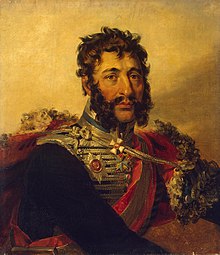Yakov Petrovich Kulnew

Yakov Kulnev ( Russian Яков Петрович Кульнев , scientific. Transliteration Jakov Petrovich Kul'ne v ; born July 25, jul. / 5. August 1763 greg. In Ludza , Livonia province , † July 20 jul. / 1. August 1812 greg killed in the battle of Klyastitsy , Polotsk district , Vitebsk governorate ) was a Russian officer who played an important role in the Russo-Swedish War .
Life
Childhood and youth
Jakow Petrovich Kulnew came from a military family. He was the son of Piotr Wasiljewitsch Kulnew (1727–1795), then first lieutenant of the Kargopol Karabiniers ' regiment, and his wife Luise Johanne nee. Graebenitz (or Graevenitz ) from Pomerania. In 1770 he began his military and school training in Saint Petersburg . He carried out his first campaign in the Russo-Turkish War (1787-1791), where he distinguished himself: He conquered the Bendery fortress.
At the military
He later took part in the Polish offensive in 1794, where he was under the command of Suvorov. After the war, Kulnev became a major and was transferred to the Sumskoi Hussar Regiment. He was promoted to colonel after the Battle of Friedland against Napoleon I in 1807, in which Kulnew fought in the Grodno Hussar Regiment .
In 1808, Kulnev commanded an independent unit in Finland, which often operated behind enemy lines in order to alarm the enemy. He distinguished himself as a cavalry commander. He was also very popular with the Finnish population. Kulnew's nickname was Don Quixote . Kulnew is known in Finnish history as a fair and chivalrous commander. He was also mentioned by the poet Runeberg , who made him the subject of a poem in the collection of Fähnrich Stahl and praised his chivalry and bravery. Kulnews across from the Swedes was Georg Carl von Döbeln, who was considered to be an equally noble and knightly commander. Kulnew and Chub met several times during some battles. On April 16, 1808 Kulnew forced his opponent Döbeln to retreat after an intense winter battle.
In the Russo-Swedish War
In early July 1808, one of the strangest meetings between the two commanders occurred. Kulnew and von Döbeln met personally in Kauhava to exchange prisoners. Among other things, the current peasant uprising in southern Ostrobothnia was discussed.
In the Battle of Oravais , Kulnev commanded the Russian vanguard and was the first to meet the Swedish defenders. Furthermore, after the Swedish withdrawal, Kulnew carried out a daring attack on the Swedish mainland in Grisslehamn near Stockholm . Kulnev's men marched across the ice from Åland to attack the Swedes from behind. On March 19, Russian troops marched along a Swedish bank to outsmart the Swedish vanguard in Grisslehamn. Fear of the enemy attack spread like wildfire among the coastal residents, who immediately started the evacuation. Kulnew was able to keep Grisslehamn occupied for a few days before returning east after negotiations were over. During this time Sweden was in an uproar because King Gustav IV Adolf had just been overthrown in a military coup.
After the war
For this operation Kulnew was awarded the Order of St. Anne . He later received the Order of St. George for his bravery .
After the Russo-Swedish War, Kulnev became major general and took part in the Russo-Turkish War. At the beginning of the Patriotic War against Napoleon I , Kulnew distinguished himself under the direction of Wittgenstein . On July 30, 1812 Kulnew fought against the French under Oudinot and was involved in the conquest of the village of Jakobovo. He then led the persecution of the French and captured more than 900 soldiers. During this chase, Kulnev and his cavalry rode into a French ambush and came under heavy artillery fire. While retreating, he was so badly wounded by a French cannonball that he died the same day.
Kulnew always commanded larger armies, independent units and vanguard. In Finland, he was the first to open fire on the Swedish army when the first retreat ended in the spring of 1808. He was also the first to reach the Oravais battlefield. He was also the first general to die in the war for Russia in 1812.
He was generally held in high regard for his human qualities and military skills.
Web links
- Detailed biography of Kulnews
- Private side to Kulnew (English) ( Memento from 1 May 2004 at the Internet Archive )
- Article Jakow Petrowitsch Kulnew in the Great Soviet Encyclopedia (BSE) , 3rd edition 1969–1978 (Russian)
- Biographies , Chronos (Russian)
- Jakow Petrowitsch Kulnew (PDF; 799 kB), Lenin Library, Vitebsk 2008 (Russian)
| personal data | |
|---|---|
| SURNAME | Kulnew, Jakow Petrovich |
| ALTERNATIVE NAMES | Кульнев, Яков Петрович (Russian) |
| BRIEF DESCRIPTION | Russian commander who also played an essential role in the Russo-Swedish War |
| DATE OF BIRTH | August 5, 1763 |
| PLACE OF BIRTH | Ludza |
| DATE OF DEATH | August 1, 1812 |
| Place of death | near Jakobowo , Polotsk District , Vitebsk Governorate |
